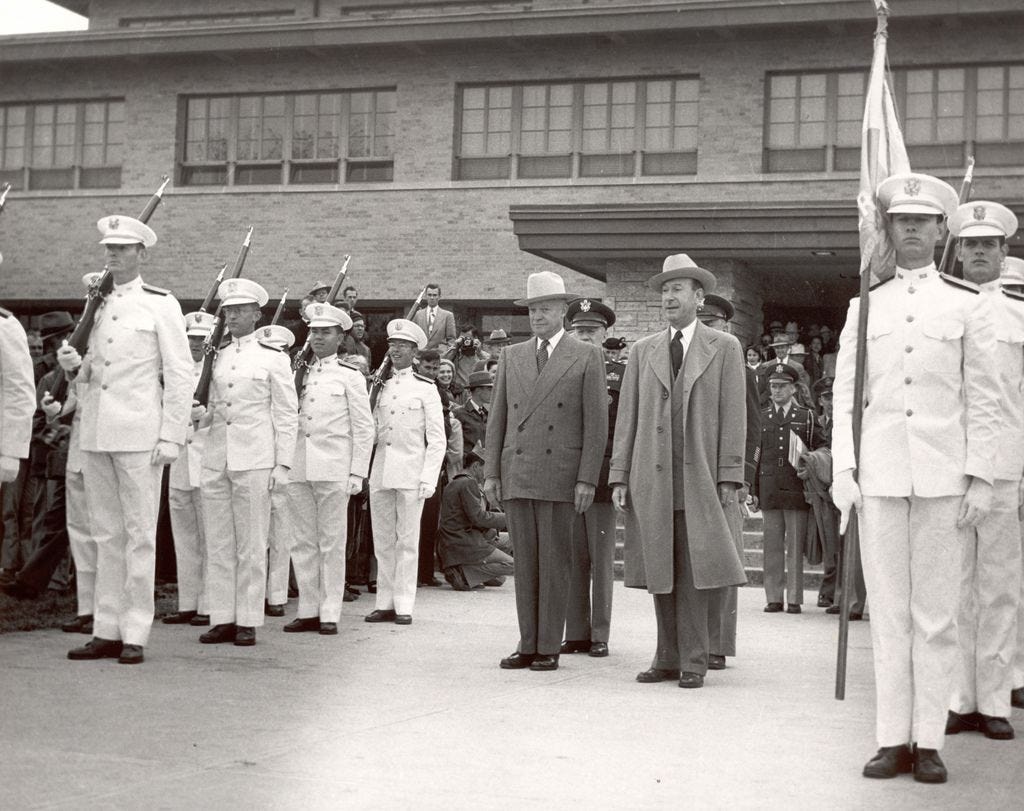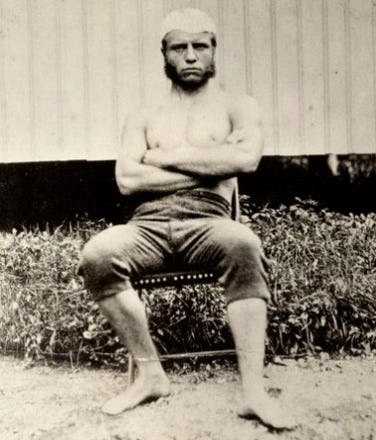How Theodore Roosevelt inspired me to transform my life
Dear friends,
As I lay in illness today, I thought of Theodore Roosevelt and his personal transformation. But I would like to start my letter to you with a confession first. Although I was in the Corps of Cadets during my undergraduate studies, I was not particularly good when it comes to physical fitness test. As a non-native English speaker who struggled to understand his professors during lectures, my excuse for not excelling in physical fitness was that I needed time to maintain my grades to get into a prestigious law school, and fitness was a secondary priority. I aimed for passing the PT tests, but barely.

My fitness became even worse during my junior year after I was not selected for the Ross Volunteers (see photo of white-uniformed Ross Volunteers with President Eisenhower), the not-so-secret secret unit within the Corps that many cadets see as the holy grail of their life in the Corps. I did not take this failure well, seeing that many less-deserving cadets ended up in the elite program while I, having proved to be a very good junior leader, was not selected for a vote by my own squadron leader in the Ross Volunteers on the ground of not being well-known enough or sellable enough.
Compounded by some other events in life, I gave up trying and began living a zombie life in the Corps. Very soon, my weight skyrocketed from 78 kg/172 lbs all the way to 90 kg/198 lbs. I also lost respect from many underclassmen who used to look up to me for guidance. In my senior year, the supervisor of my division warned that I could lose my cadet status with that BMI. Luckily, being a diligent student, I avoided the next BMI exam and graduated from Texas A&M early, carrying my weight to Europe.
But I had never been able to get rid of “my luggage”. Not until I started reading The Rise of Theodore Roosevelt by Edmund Morris in July, 2018.

Theodore Roosevelt and the Fellowship of the Doers
Young Teddy was born a hyperactive child who was plagued by illness. Having undergone a thorough medical examination when he was twelve, Dr. A. D. Rockwell found the problem to be his underdeveloped chest. “The lungs crammed into that narrow cavity were themselves crammed with asthma, and the mere act of breathing placed a strain on his heart”. With this diagnosis, his father Theodore Senior said:
“Theodore, you have the mind but you have not the body, and without the help of the body the mind cannot go as far as it should. You must make your body. It is hard drudgery to make one’s body, but I know you will do it.”
With a half-grin, half-snarl, Teddy jerked his head back and replied: “"I’ll make my body.” And Teddy began his long journey to transform his body with bulldog tenacity. Teddy’s younger sister Corinne wrote:
“For many years, one of my most vivid recollections is seeing him between horizontal bars, wielding his chest by regular, monotonous motion—drudgery indeed.”
Very soon, Teddy experienced significant health improvement, without a single mention of illness in the year 1871. Savouring his newfound physical strength, he plunged into nature for swimming and climbing. Yet an episode of bullying by a group of stronger boys forced Teddy to realize that, by the harsh standards of the world, he was still a weakling. Therefore, Teddy decided to join “the fellowship of the doers”, exercising twice as hard as before and learning how to give and take punishment. “Accordingly, with my father’s hearty approval, I started to learn to box.”

Teddy would indeed be able to give punishments. Later in life, as a New York State Assemblyman, he was insulted by a notorious Tammany member, J. J. Costello, who insulted Teddy about his pea jacket (legend quotes it as “Won’t Mamma’s boy catch cold?”). A fellow Assemblyman recalled that:
“Teddy knocked him down and he got up and he hit him again, and when he got up he hit him again, and he said, ‘Now you go over there and wash yourself. When you are in the presence of gentlemen, conduct yourself like a gentleman.’”
He would also fall in love with the Wild West, paying yearly visits to his ranch and hunting, including a deadly encounter with a nine-foot, twelve-hundred-pound grizzly bear that was barely 8 paces away from him:
“Doubtless my face was pretty white, but the blue barrel was as steady as a rock as I glanced along it until I could see the top of the bead fairly between his two sinister-looking eyes; as I pulled the trigger I jumped aside out of the smoke, to be ready if he charged; but it was needless, for the great brute was struggling in the death agony … the bullet hole in his skull was as exactly between his eyes as if I had measured the distance with a carpenter’s rule.”
Theodore Roosevelt’s colorful life would be filled with such instances of physical challenges, be it leading his Rough Riders in the Battle of San Juan Hill in the Spanish-American War, completing the almost fatal Roosevelt–Rondon Scientific Expedition after losing his independent run for presidency, or being hit by a bullet in 1912 during his campaign for presidency:
“It takes more than that to kill a bull moose,” the wounded candidate assured them. He reached into his coat pocket and pulled out a bullet-riddled, 50-page speech. Holding up his prepared remarks, which had two big holes blown through each page, Roosevelt continued. “Fortunately I had my manuscript, so you see I was going to make a long speech, and there is a bullet—there is where the bullet went through—and it probably saved me from it going into my heart. The bullet is in me now, so that I cannot make a very long speech, but I will try my best.”
Theodore Roosevelt is remembered as a tough man. But he wasn’t a tough man by birth. It all started with that single promise of making his own body.

My journey so far
It is difficult to read the biography of this fascinating figure without feeling inspired. Indeed, I wanted to make my body, again. It doesn’t matter that I am already 28 years old and it doesn’t matter that I have once shown weakness when facing external challenges and failures. What is important is that I keep trying to transform who I am.

So I started running again. It was not easy. In the beginning I could barely run 3km at over 6min/km. But every time I felt like my lung was exploding, every time I felt the poignant pain in my abdomen, and every time I felt numbness in my arms and legs, I imagined what Teddy would have gone through along his daily drudgery. My struggle would not have been as bad as his. So I kept going and I learned to enjoy this painful process of self-improvement.
In the past 10 months, I have ran 127 times and completed 558km. My weight is now at 80kg. I am nowhere near where I want to be in terms of my fitness, but I started adding dumbbells to my routine earlier this year with the goal of gaining more muscles. I don’t know if I’d ever live as adventurous a life as Teddy, but I surely will emulate his bulldog tenacity in changing my life for the better.
I hope Theodore Roosevelt can inspire you, too. Please forgive me if this newsletter is less edited given my present illness. Thanks for reading and I wish you a good weekend!


